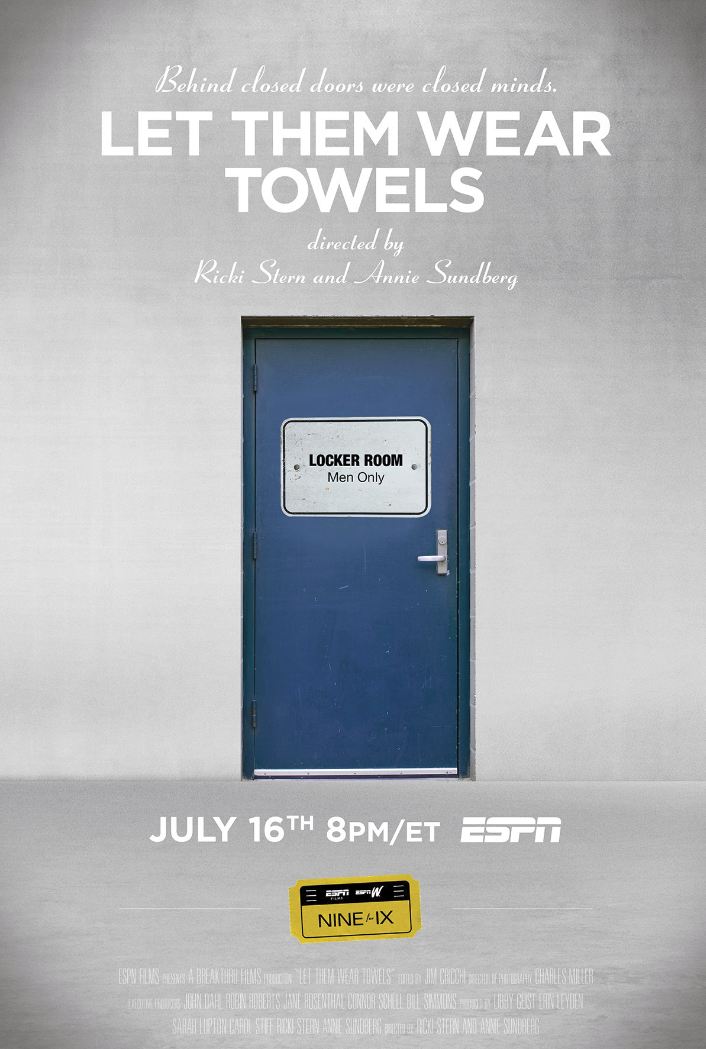Let Them Wear Towels -- the third of nine documentaries in the eclectic ESPN Nine for IX series about women in sports that airs on July 16 -- isn't really about female athletes at all, rather it's about the female journalists who won the right to compete with their male colleagues to cover the story in the locker room. This measured and smart look back at the struggle for equality and access to every room in the stadium echoes scenes from this summer's Jackie Robinson movie 42 - only this time, there is a little crying in baseball.
Inspired by the 40th anniversary of Title IX, the series presents stories of women who played hard to win something -- equality, respect, acceptance or just first place -- all against the backdrop of the seismic social changes for women in the last 40 years. Each story is different, but the outrage, the struggle and always, the admiration for just how awesome women are is steady throughout. Whether it's Coach Vivian Stringer taking on Imus after he insulted her Rutgers basketball team or Venus Williams demanding equal pay at Wimbledon or Sheryl Swoopes paving the way for gay women or Audrey Mestre who free-dove to her death, these women have an integrity and a real light that just shines through every film.
And for once, journalists, and in this case, women journalists are seen as their true selves- not members of the pack of mindless jackals who swarm hapless subjects with microphones and shouts, not the overly sexualized Mata Haris who manipulate and exploit their appeal (see House of Cards) but thoughtful, articulate, low-key and very focused women who just want to do their jobs.
"That's why it was all so ridiculous" says series producer Jane Rosenthal, "All they were trying to do was tell the story... and the fact was that you couldn't do your job because you couldn't go into the locker room and tell the other half of the story"
The stories are gripping and well-told by filmmakers Ricki Stern and Annie Sundberg, who also produced the sublime Joan Rivers - A Piece of Work.
The maturity and class of these reporters in the face of literal locker-room antics brings to mind older sisters babysitting a bunch of fifth grade boys. Ignore them and they'll stop .And as if they want to be in this stinky sweaty room with some of these characters. But it's part of the job.
We learn about Melissa Ludkte of Sports Illustrated who successfully challenged Major League Baseball in 1977after she was banned from the New York Yankees locker room and missed out on the operatic interplays between Reggie Jackson and Billy Martin. "The world of big time sports was like the tree house where the boys went and nailed a sign that said 'no girls allowed.'"
We hear New York Times reporter Claire Smith describe literally being pushed out of the San Diego Padres locker room in 1984. Humiliated and furious, she wept when pitcher Steve Garvey came out to the hallway immediately afterwards to give her an interview and quietly stood by until she got herself together and asked her first question.
And these are women who were not looking for controversy.
"They speak so strongly and so steadily about this but when you hear about how vulnerable they were , it's hard to believe they went through this," says ESPN Films Associate Director of Development Libby Geist -- "we were impressed at how well spoken and how smart these were women were, although we should have known that knowing they were writers." She adds that many were hesitant to revisit those times. "They felt they were past it now and wanted to make sure everyone knew they weren't complaining, this is just something that happened."
What happened to Lisa Olson, however, became a cause célèbre and speaks to the threat of sexual violence that was always an undercurrent to this story. Lisa Olson was the 26-year-old reporter for the Boston Herald who spoke up about being sexually harassed in the locker room by players for the New England Patriots. She received threatening phone calls, hate mail and her tires were slashed. Patriot's owner Victor Kiam publicly called her "a classic bitch." An NFL investigation found she had been 'degraded and humiliated' and her case helped create guidelines against harassment of female reporters . The experience was so difficult, however, that Olson left the United States and lived in Australia for several years.
"It was an ugly backlash", says Geist, who reports that Olson has never spoken to her experience but did view the film. "I understand she watched it with friends and a bottle of wine and while she's still emotional about it she was supportive of the way we treated her story.
Nine for IX celebrates the progress women have made in the last 40 years not only in sports but in every human arena and Let Them Wear Towels helps remind us that every single inch forward brings with it colossal resistance. As one of these reporters calmly puts it, " all change is hard, especially when you're giving up power."
Or as Jane Rosenthal says, "look, we just had the first two women admitted to Augusta, we just had a Saudi woman entered into the Olympics -- women are still being held back throughout the world and the only way we can solve this is through education and telling these stories. To have that girl effect be in full effect."

